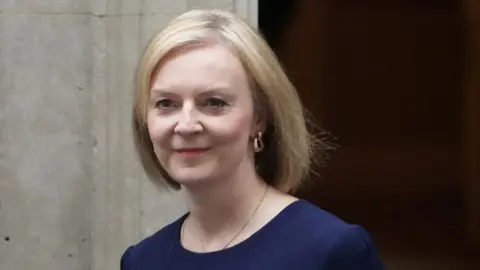Faisal Islam: Liz Truss' path to regain market credibility

 Reuters
ReutersThe strategy from the government is that there will be no changes to the mini-budget.
They believe that the fleshing out of the details of their economic plans on planning laws, energy, childcare, worker visas - will persuade markets that UK growth will accelerate.
The combination of these reforms over the next few weeks and a medium-term plan to reduce the national debt, with "iron discipline" on existing spending plans, will, they argue, turn things around.
Those spending plans were set in cash terms last year. They do not account for 10% inflation. And the chancellor himself would not commit to updating benefits in line with inflation, as was previous policy. Pension increases will continue to be protected.
The "fiscal surprise" was "small," a reference to the £2bn value of the scrapping of the 45p tax rate. That means it is not possible, say the government, to have caused the market chaos.
Instead they view the turmoil as the result of the US Federal Reserve aggressively hiking interest rates, partly leading to a strong dollar that helps rein in its inflation.
Ultimately, the plan is that the economic reform package will enable the Bank of England to bring down interest rates as quickly as possible after inflation is defeated.
That is what is underpinning the offensive from the prime minister and Cabinet. If it works, the markets will realise that they were wrong about the mini-budget, and the situation will recover.
If it does not work there will be weeks of uncertainty as currency and borrowing markets continue to move wildly in response to every announcement, rumour of a statement or piece of economic data.
It is impossible to disentangle the market reaction from the politics. Already a small number of senior Conservatives are breaking ranks with their leadership on aspects of the mini-budget.
Amid all of this the independent financial watchdog the Office for Budget Responsibility's (OBR) chairman will meet the prime minister in Downing Street.
Things have moved rather quickly since his offer to do a forecast alongside the mini-budget was rejected, contributing, many in the world of finance argue, to the chaos.
The OBR, its costings, methods and forecasts are now central to the plan to regain confidence. The Treasury orthodoxy, the "bean counters", and the "abacus economics", strike back.
